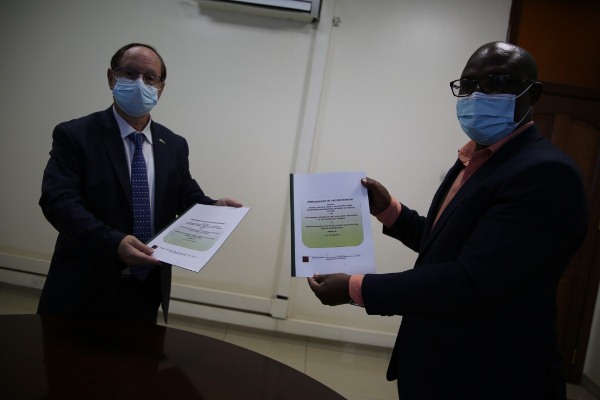
Rwanda and the State of Israel entered into bilateral cooperation for skills upgrading in the agriculture sector in general and in horticultural sector in particular in December 1, 2014.
Since then, every year more than 150 students from Rwanda receives scholarship to study in Israel modern/smart Agriculture and are exposed to advanced technologies through a hands-on training in Israel, the Rwanda-Israel Horticulture Center of Excellence based at Murindi was established.
From June 2016 to March 2020, the Center of Excellence trained about 1484 beneficiaries have been trained, including agriculturists from Government institutions, Non-Governmental Institutions (NGOs), higher learning institutions, private companies, students and farmers.
About 30 different varieties of vegetables have also been tested for adaptation to Rwandan conditions while 9 varieties of different types of fruits (avocado, mango and citrus) are being introduced to Rwanda. A total of 17,200 seedlings, rootstocks and seeds have been in the horticulture center nursery for acclimatization and thereafter will be transferred to Rwandan Farmers.
From September 2017, about 16 different types of vegetables made of 49 different varieties of vegetables were tested in 3 cycles for adaptability to Rwandan conditions. Around 219,972 vegetable seedlings and 150 tons of various vegetables were produced during 2019-2020. The first modern mother plantation of mango, avocado and citrus under drip irrigation system was established on 3 ha for the purpose of demonstration, training and source of nursery clean materials (scions, rootstock).
Extending the Israel and Rwanda Sign for Agricultural Agreement
On Tuesday 8th March 2021, Dr. Ron Adam, Ambassador of Israel to Rwanda and Mr. MUSABYIMANA Jean Claude, the Permanent Secretary in the Ministry of Agriculture and Animal Resources signed signed an agreement to extend Israel and Rwanda Agricultural Cooperation through the Horticulture Center of Excellence.
The main goal is to contribute to the improvement of the horticultural production in Rwanda through the exchange of MASHAV’s experience and knowledge; to introduce Israeli agriculture and farming technologies in Rwanda; to strengthen the technical skills of Rwandan researchers, extension the circle of agents through transfer of knowledge through capacity building and other skills among others. (End)
